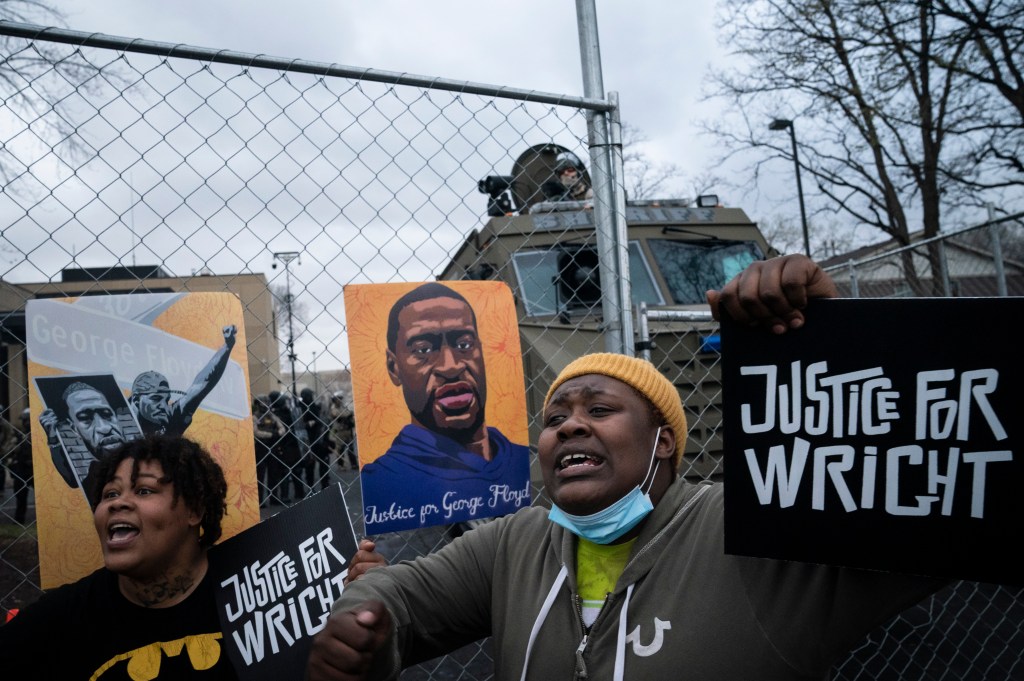Prosecutor: Chauvin ‘had to know’ Floyd’s life was in danger
Published 12:00 pm Monday, April 19, 2021

- Demonstrators shout along a perimeter fence guarded by law enforcement officers during a protest over Sunday's fatal shooting of Daunte Wright during a traffic stop, outside the Brooklyn Center Police Department, Wednesday, April 14, 2021, in Brooklyn Center, Minn.
MINNEAPOLIS (AP) — Officer Derek Chauvin “had to know” he was squeezing the life out of George Floyd as the Black man cried out over and over that he couldn’t breathe and finally fell silent, a prosecutor told jurors Monday as closing arguments began at Chauvin’s murder trial.
“Use your common sense. Believe your eyes. What you saw, you saw,” Steve Schleicher said, referring to the excruciating video of Floyd pinned to the pavement with Chauvin’s knee on or close to Floyd’s neck last May for up to 9 minutes, 29 seconds, as bystanders yelled at the white officer to get off.
Closing arguments began with Minneapolis on edge against a repeat of the violence that erupted in the city and around the U.S. last spring over Floyd’s death.
The defense contends the 46-year-old Floyd died of his underlying heart disease and his illegal use of fentanyl and methamphetamine.
Schleicher dismissed some of the defense theories as “nonsense,” saying Chauvin’s pressure on Floyd killed him by preventing him from breathing.
He rejected the drug overdose argument, the contention that police were distracted by what they saw as hostile onlookers, and the suggestion that Floyd suffered carbon monoxide poisoning from auto exhaust, and he sarcastically referred to the notion that it was heart disease that killed him as an “amazing coincidence.”
“Is that common sense or is that nonsense?” the prosecutor asked the racially diverse jury.
Schleicher described how Chauvin ignored Floyd’s cries that he couldn’t breathe, and continued to kneel on Floyd after he stopped breathing and had no pulse — even after the ambulance arrived.
Floyd was “just a man, lying on the pavement, being pressed upon, desperately crying out. A grown man crying out for his mother. A human being,” Schleicher said. He said Chauvin “heard him, but he just didn’t listen.”
Chauvin was “on top of him for 9 minutes and 29 seconds and he had to know,” Schleicher said. “He had to know.”
The prosecutor said Floyd “was not a threat to anyone.”
“He wasn’t trying to hurt anyone. He wasn’t trying to do anything to anyone. Facing George Floyd that day that did not require one ounce of courage. And none was shown on that day. No courage was required,” Schleicher said. “All that was required was a little compassion and none was shown on that day.”
Schleicher quickly got to the heart of the case — whether Chauvin’s actions were those of a reasonable officer in similar circumstances — saying a reasonable officer with Chauvin’s training and experience should have known a handcuffed Floyd did not pose a risk to officers.
He said Floyd was terrified of being put into the tiny backseat of the squad car when he struggled with officers, then played video of Floyd being pulled out of the car and forced to the ground — noting that he was on his knees and said thank you
“A reasonable officer should’ve recognized Floyd wasn’t trying to escape. … The problem was the back of the car. Just like George Floyd tried to explain over and over,” the prosecutor said.
Judge Peter Cahill opened the day’s court session by instructing the jurors on reviewing different types of evidence and told them that they will consider each charge against Chauvin separately.
The anonymous jury will deliberate in a downtown courthouse surrounded by concrete barriers and razor wire, in an anxious city heavily fortified by National Guard members and just days after fresh outrage erupted over the police killing of a 20-year-old Black man in a nearby suburb.
A few protesters gathered outside the courthouse Monday as light snowflakes blew in the wind. “No breaths. No pulse. 3 1/2 minutes. Chauvin didn’t let up/get up,” read one protester’s sign.
Chauvin, 45, is charged with second-degree murder, third-degree murder and second-degree manslaughter. All three charges require the jury to conclude that Chauvin’s actions were a “substantial causal factor” in Floyd’s death — and that his use of force was unreasonable.
Each count carries a different maximum sentence: 40 years for second-degree unintentional murder, 25 years for third-degree murder, and 10 years for second-degree manslaughter. Sentencing guidelines call for far less time, including 12 1/2 years on either murder count.





